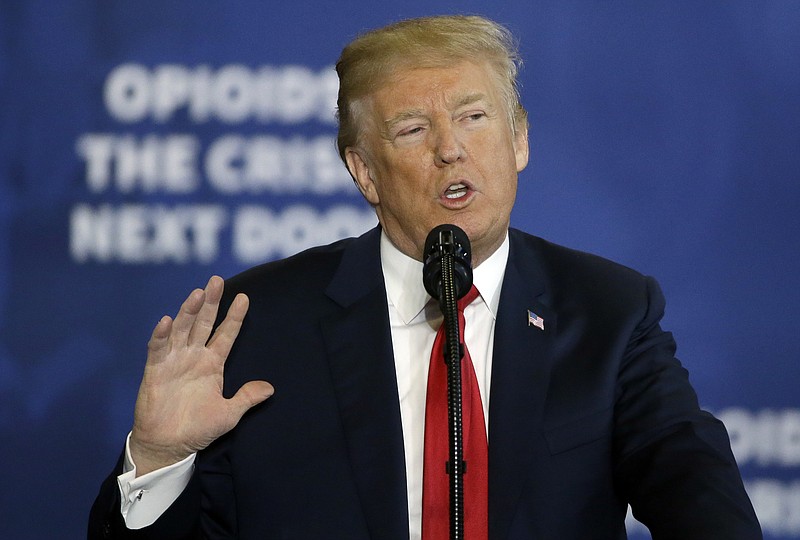If the president is serious about pursuing a death penalty for drug dealers, the Big Pharma makers and distributors of opioids, along with the doctors who prescribe them, better watch out.
Oh, but wait. That's all legal - even though the opioid epidemic killed more than 42,000 Americans in 2016 and is growing all the time. The CDC recently reported that emergency rooms recorded a 30 percent spike in opioid overdoses last summer.
Trump signed a budget in February that includes $6 billion over two years to address the opioid crisis. That's just a fraction of what public health and addiction experts say is needed. Meanwhile, some of those same experts say the epidemic's toll in lives and livelihoods range from tens to hundreds of billions of dollars each year.
The president's plan includes prevention marketing, treatment measures and proposed harsh crackdowns on traffickers and dealers. It calls (again and again) for a southern border "wall" and for a pushers' death penalty.
Of course, neither the opioids nor their synthetic imitator, fentanyl, come from Mexico. Nor do toughened drug crackdowns and sentences affect either the drug trade or drug deaths. In fact, a 2012 study found that there is no good evidence that capital punishment deters crime of any kind.
To find the root of our opioid epidemic, we need look no further than our own pharmaceutical companies, our own doctors and our own lawmakers.
America's opioid epidemic began in the 1990s with the over-prescription of opioid painkillers like Oxycontin and other generic hydrocodones. U.S. doctors were schooled by drug companies (and the so-called experts paid by those drug companies) that these drugs were less addictive than they really are.
In the next decade, many physicians swallowed that Big Pharma marketing and set aside their obligation to "do no harm." The prescriptions became habit-forming for patients, and what started with pills progressed to a heroin addiction. In 2014, a synthetic opioid that is 50 times more potent than heroin - fentanyl - came on the scene from China, pouring gasoline on the fire - especially in the Midwest, Appalachia and New England. Today, drug overdoses have become the leading cause of death among Americans under 50.
Health officials say more than 95 million people used prescription painkillers in the past year - more than used tobacco.
So far, the federal government, if anything, has helped the drug makers exacerbate the opioid epidemic - like when Congress passed legislation that had the effect of shutting down Drug Enforcement Administration investigations of opioid pharmaceutical distributors.
In 2014, Tennessee's U.S. Rep. Marsha Blackburn, a Republican now seeking Bob Corker's U.S. Senate seat, joined with Rep. Tom Marino, R-Pa., to write a letter accusing then-DEA Office of Diversion Control Joe Rannazzisi of trying to "intimidate the United States Congress." Blackburn and Marino asked for an Inspector General's probe into Rannazzisi - who was issuing fines and trying to make additional cases against pharmaceutical distributors making "suspicious" deliveries of opioids. One example of "suspicious" was 9 million hydrocodone pills delivered over two years to a pharmacy in Kermit, W.Va., where the town's population was just 392 people.
Blackburn, who received $120,000 in campaign contributions from the pharmaceutical industry between 2013 and June 2017, and Marino, who received $92,500, went on in 2015 to push a bill that substantially raised the legal bar on the DEA's ability to crack down on the drug distributors, including the DEA's ability to freeze suspicious shipments. Blackburn and Marino wrapped their bill in the American flag, saying the legislation was needed to help people with pain - like our veterans - have steady access to medication.
The bill passed in 2016 with no opposition in either the House or the Senate. And why not? Overall, the drug industry spent $102 million lobbying Congress on the bill and other legislation between 2014 and 2016, according to a Washington Post review of lobbying reports.
Marino, until mid-October, was Trump's nominee to lead the Office of National Drug Control Policy. He withdrew his name after a Washington Post and "60 Minutes" report indicated he did the bidding of the pharmaceutical industry in weakening law enforcement's ability to curb black-market opioid sales.
At about the same time, Blackburn backtracked: "If there are any unintended consequences from this bipartisan legislation - which was passed unanimously by the House, Senate and was signed into law by President Obama - they should be addressed immediately," her spokesperson said. In November, Blackburn had the consummate gall to issue a news release heralding her co-sponsorship of a bill to create an opioid task force. Of course, the task force's work would be aimed primarily at fentanyl and heroin - not pharmaceutical opioids.
Just a month later, in December, the U.S. Justice Department reached a milquetoast agreement with one of the nation's largest pharmaceutical distributors, McKesson Corp., rather than prosecute officials there for failing to report outrageously suspicious orders of painkillers.
Instead of prosecution, McKesson agreed to pay a $150 million fine and to suspend some sales in four states. Opioids account for about $4 billion per year in sales for McKesson, according to news reports.
Perhaps if the president wants to execute some drug dealers, he might make pharmaceutical opioid fines commensurate with pharmaceutical opioid profits.
